Retired 1st Lt. Frederick Harold Alexander passed away Sept. 17, 2011, at the age of 92.
Retired 1st Lt. Frederick Harold Alexander passed away Sept. 17, 2011, at the age of 92.
|
Administrator
|
This post was updated on .
Our good friend retired 1st Lt. Frederick Harold Alexander (The Kid) passed away Sept. 17, 2011, at the age of 92. Born in London, England, he and his mother moved to Seattle, where he grew up. In his youth. he was a hockey player; and in 1942, he enlisted in the U.S. Air Force. He was a P-51 fighter pilot in the 50th Fighter Group in World War II. He was a fighter ace with 73 missions and 8 kills. Fred was a 60-year resident of Las Vegas, a general contractor for 40 years and an avid tennis player until the age of 91. His passions were flying airplanes, cars and auto racing. He raced midgets, sprint cars, sports cars and stock cars throughout his life. He is survived by his daughter, Terry Alexander; grandsons, Joshua Damron and Dustin Davis; and three great-grandchildren, all of Las Vegas.
Here is an article about Fred's life that was published in the Review Journal on July 4th, 2011
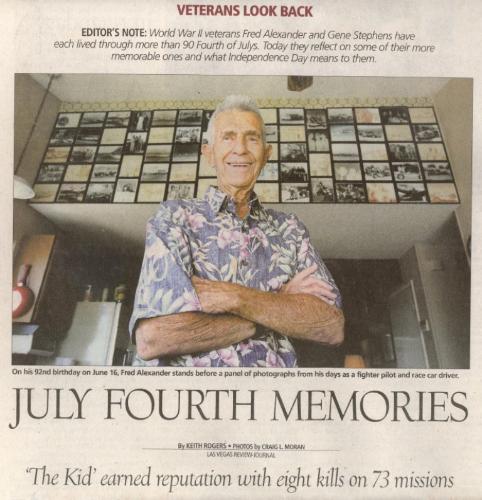 World War II veterans Fred Alexander and Gene Stephens have each lived through more than 90 Fourth of Julys. Today they reflect on some of their more memorable ones and what Independence Day means to them.
He's still "The Kid" at 92.
As an ace fighter pilot who battled German warplanes over France and Berlin in World War II, Fred Alexander's youthful reputation for pushing the envelope in whatever he did spread quickly through the ranks of his foes in the Luftwaffe.
"Look out. Run and hide. Here he comes," a chipper Alexander said last month on his 92nd birthday, explaining why his P-51 Mustang had the words, "It's The Kid," printed in bold letters on the plane's fuselage. "Aviation taught me to have faith in myself."
For half the Fourth of Julys in his life, Alexander estimates he has been either overseas or flying airplanes far from Las Vegas, where he made a career as a commercial pilot, engineer and construction contractor after the war.
"The best way to put it is I stand up when they play the national anthem. And when one of those idiots that sings messes it up, I get mad," he said.
"The Fourth of July means a hell of a lot to me."
His Independence Day observances have been in the cockpits of airplanes and the driver's seat of a race car. He raced sprint cars, stock cars and open-wheel racers throughout his life and played tennis as a nonagenarian. He quit racing four years ago after the throttle stuck on his sprint car and it slid into a barricade at a track in Marysville, Calif., leaving him with cracked ribs.
Some Fourth of Julys stick out more than others.
Take July 4, 1944. He was out with mates from the 77th Fighter Squadron. Instead of relying on machine guns, their Mustangs were armed with bombs that conveniently replaced reserve gas tanks. They made their own fireworks over Tours, France, in the heart of wine country. Their target was a stone bridge near a big cathedral.
"The guy up in front of us was a bombardier, so we all stayed in formation and dropped bombs on that bridge," he said.
The mission was mild compared to D-Day a few weeks before when the 77th, whose logo was five playing cards fanned out -- four sevens and an ace of spades -- flew the morning attack on Normandy in P-38s. They used the twin-tailed P-38s instead of the single-tail P-51s because the design of the P-38 resembled that of German planes. The idea was that P-38s would attract less anti-aircraft fire by fooling the enemy into thinking they were friendly German bombers.
"I saw the whole invasion," Alexander recalled. "We gassed up, went out and spent an hour and a half over the invasion, and then they said, 'There it is. Open season. Anything that moves, shoot it.'
"I shot buildings. I shot cars. ... I had more damn fun than a circus."
The Kid chalked up at least eight kills -- destroyed enemy warplanes -- in 73 missions that he noted in his pilot's log before the war in Europe ended. On June 6, 1944, he was assigned Neptune convoy patrol. On June 18, 1944, he flew over the Ruhr Valley, to target a place where the Nazi war machine manufactured ball bearings. The next day he was in the skies over Pas-de-Calais, France.
"The first two Germans I shot down were right over the housetops of Berlin," he said. "I can tell you after I shot them down I started climbing up and my insides kind of turned over."
On that mission, he was protecting bombers when he spotted the pair of Messerschmitt 109s and prepared for a dogfight.
"I peeled off and came down behind them and they went ahead and split up, and I followed them down to the ground," Alexander said. "They didn't realize I was right behind them. I pulled up and shot the one right off the bat. I got him.
"The other one went up, and he and I did some tail-chasing for a while. I don't know how I did it. I ended up a little bit on his tail in one of the turns," he said, describing how he fired.
"I must have hit a line, because he started trailing coolant and smoke and then he peeled off. As he headed to the ground I got a couple more shots on him before he bellied in.
"I said to myself, 'What the hell. I'm over their Pentagon.' Or, 'I'm over their capital, Berlin, shooting down two guys. And now I've got two hours to get home and find my way home all by myself.'
"What I'm telling you is: You're not that much of a hero as you think you are. You're no hero. It's just what you were supposed to be doing. And doing it was a lot of fun."
Hero or not in his mind, Alexander, an engineering student from the University of Washington, received two Distinguished Flying Crosses and multiple Air Medals in World War II.
His love for aviation was passed down from his father, a World War I pilot who died in a plane crash after the war when Fred was 5. Because he earned a private pilot's license at 18, Fred had a foot in the door to be a military pilot. He joined the Navy ROTC program but wanted to fly P-38 Lightnings, "and you had to be in the (Army) Air Force to do that. When they came to me, I said I'll join if you can guarantee that I'll fly P-38s."
While stationed in England, he would practice flying on his days off.
"Do you realize that no matter what you do every day of the week, the sun is always shining up there. All you've got to do is climb up there."
His advice for today's soldiers: "Get all the experience you can before you go out and face life. Most of the people in the military are so young they've got a life afterwards in front of them. The experience is in how they treat other people, pay attention to orders and technical things. This is worth its weight in gold."
World War II veterans Fred Alexander and Gene Stephens have each lived through more than 90 Fourth of Julys. Today they reflect on some of their more memorable ones and what Independence Day means to them.
He's still "The Kid" at 92.
As an ace fighter pilot who battled German warplanes over France and Berlin in World War II, Fred Alexander's youthful reputation for pushing the envelope in whatever he did spread quickly through the ranks of his foes in the Luftwaffe.
"Look out. Run and hide. Here he comes," a chipper Alexander said last month on his 92nd birthday, explaining why his P-51 Mustang had the words, "It's The Kid," printed in bold letters on the plane's fuselage. "Aviation taught me to have faith in myself."
For half the Fourth of Julys in his life, Alexander estimates he has been either overseas or flying airplanes far from Las Vegas, where he made a career as a commercial pilot, engineer and construction contractor after the war.
"The best way to put it is I stand up when they play the national anthem. And when one of those idiots that sings messes it up, I get mad," he said.
"The Fourth of July means a hell of a lot to me."
His Independence Day observances have been in the cockpits of airplanes and the driver's seat of a race car. He raced sprint cars, stock cars and open-wheel racers throughout his life and played tennis as a nonagenarian. He quit racing four years ago after the throttle stuck on his sprint car and it slid into a barricade at a track in Marysville, Calif., leaving him with cracked ribs.
Some Fourth of Julys stick out more than others.
Take July 4, 1944. He was out with mates from the 77th Fighter Squadron. Instead of relying on machine guns, their Mustangs were armed with bombs that conveniently replaced reserve gas tanks. They made their own fireworks over Tours, France, in the heart of wine country. Their target was a stone bridge near a big cathedral.
"The guy up in front of us was a bombardier, so we all stayed in formation and dropped bombs on that bridge," he said.
The mission was mild compared to D-Day a few weeks before when the 77th, whose logo was five playing cards fanned out -- four sevens and an ace of spades -- flew the morning attack on Normandy in P-38s. They used the twin-tailed P-38s instead of the single-tail P-51s because the design of the P-38 resembled that of German planes. The idea was that P-38s would attract less anti-aircraft fire by fooling the enemy into thinking they were friendly German bombers.
"I saw the whole invasion," Alexander recalled. "We gassed up, went out and spent an hour and a half over the invasion, and then they said, 'There it is. Open season. Anything that moves, shoot it.'
"I shot buildings. I shot cars. ... I had more damn fun than a circus."
The Kid chalked up at least eight kills -- destroyed enemy warplanes -- in 73 missions that he noted in his pilot's log before the war in Europe ended. On June 6, 1944, he was assigned Neptune convoy patrol. On June 18, 1944, he flew over the Ruhr Valley, to target a place where the Nazi war machine manufactured ball bearings. The next day he was in the skies over Pas-de-Calais, France.
"The first two Germans I shot down were right over the housetops of Berlin," he said. "I can tell you after I shot them down I started climbing up and my insides kind of turned over."
On that mission, he was protecting bombers when he spotted the pair of Messerschmitt 109s and prepared for a dogfight.
"I peeled off and came down behind them and they went ahead and split up, and I followed them down to the ground," Alexander said. "They didn't realize I was right behind them. I pulled up and shot the one right off the bat. I got him.
"The other one went up, and he and I did some tail-chasing for a while. I don't know how I did it. I ended up a little bit on his tail in one of the turns," he said, describing how he fired.
"I must have hit a line, because he started trailing coolant and smoke and then he peeled off. As he headed to the ground I got a couple more shots on him before he bellied in.
"I said to myself, 'What the hell. I'm over their Pentagon.' Or, 'I'm over their capital, Berlin, shooting down two guys. And now I've got two hours to get home and find my way home all by myself.'
"What I'm telling you is: You're not that much of a hero as you think you are. You're no hero. It's just what you were supposed to be doing. And doing it was a lot of fun."
Hero or not in his mind, Alexander, an engineering student from the University of Washington, received two Distinguished Flying Crosses and multiple Air Medals in World War II.
His love for aviation was passed down from his father, a World War I pilot who died in a plane crash after the war when Fred was 5. Because he earned a private pilot's license at 18, Fred had a foot in the door to be a military pilot. He joined the Navy ROTC program but wanted to fly P-38 Lightnings, "and you had to be in the (Army) Air Force to do that. When they came to me, I said I'll join if you can guarantee that I'll fly P-38s."
While stationed in England, he would practice flying on his days off.
"Do you realize that no matter what you do every day of the week, the sun is always shining up there. All you've got to do is climb up there."
His advice for today's soldiers: "Get all the experience you can before you go out and face life. Most of the people in the military are so young they've got a life afterwards in front of them. The experience is in how they treat other people, pay attention to orders and technical things. This is worth its weight in gold."
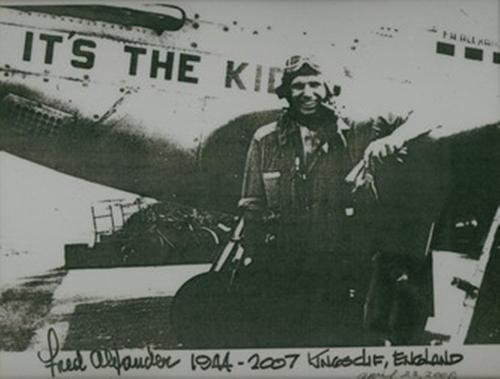
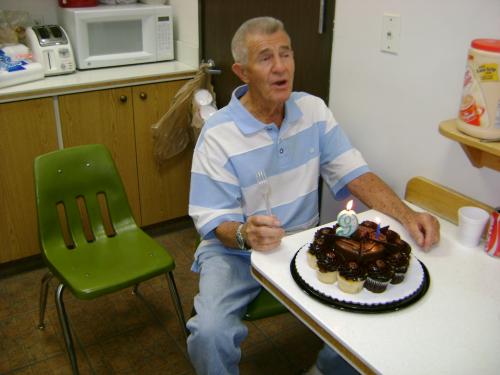
 Fred celebrates his 91st birthday at Micar.
Fred celebrates his 91st birthday at Micar.
 We will miss you Fred,
We will miss you Fred,
 Brian, Mike, Biff Caruso and all the guys at Micar
Brian, Mike, Biff Caruso and all the guys at Micar
|
Fred Alexander at the Caruso Racing Museum 2008
|
Administrator
|
This post was updated on .
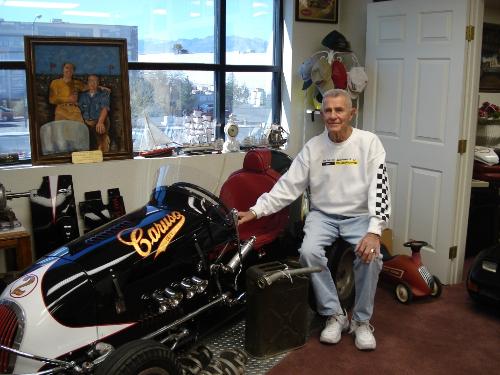 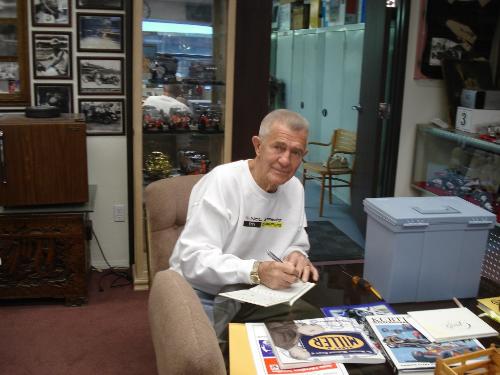 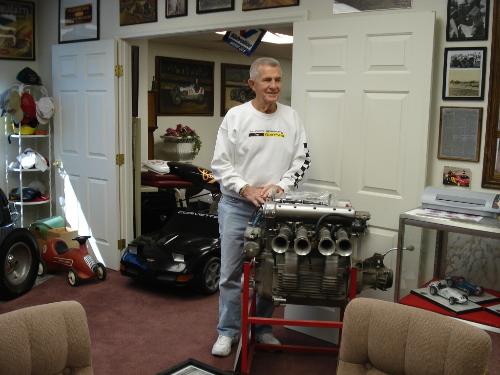 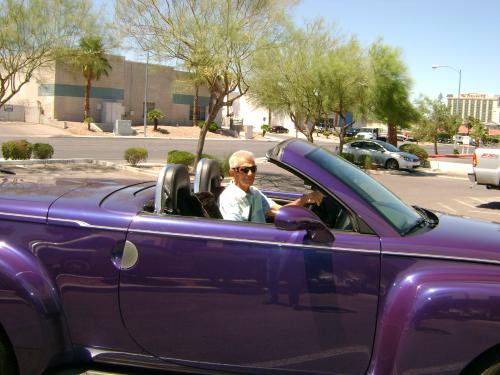 Fred in his Chevy SSR truck in July 2011 |
«
Return to News & Announcements
|
1 view|%1 views
| Free forum by Nabble | Edit this page |

